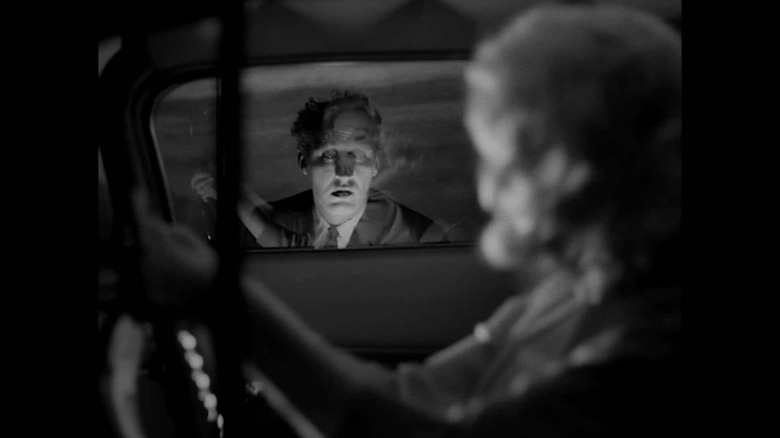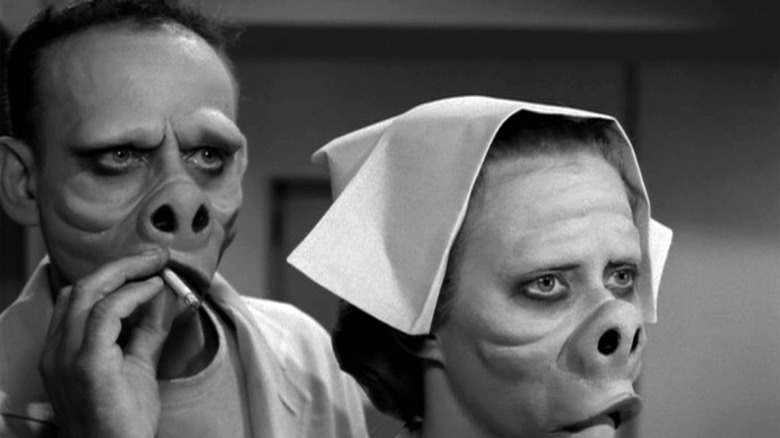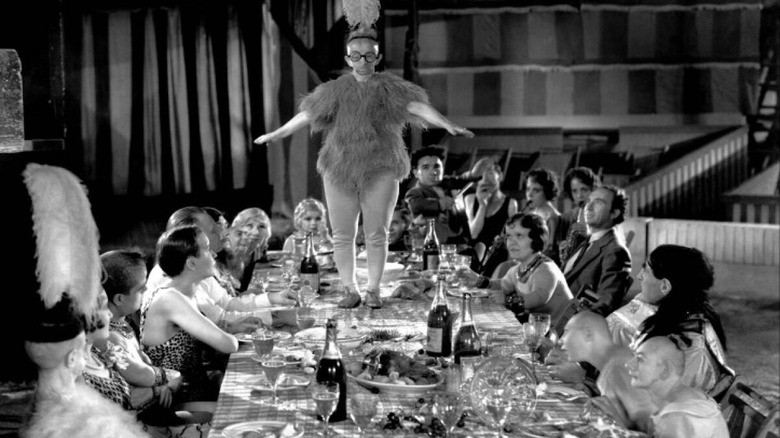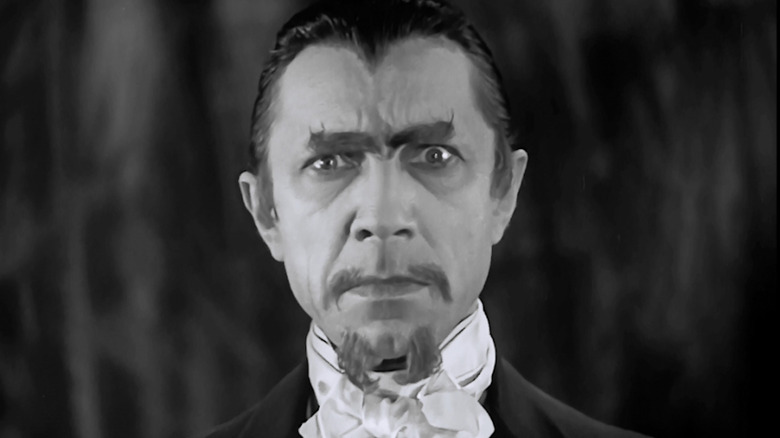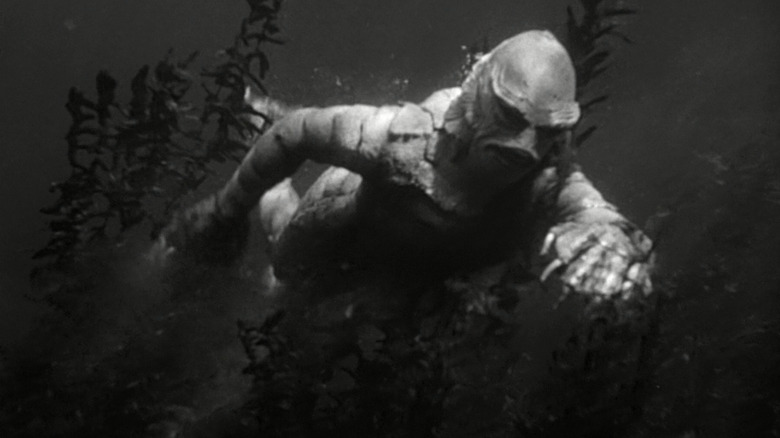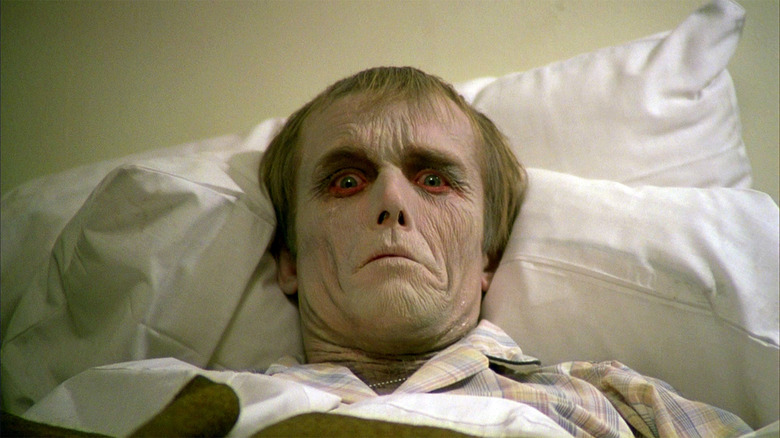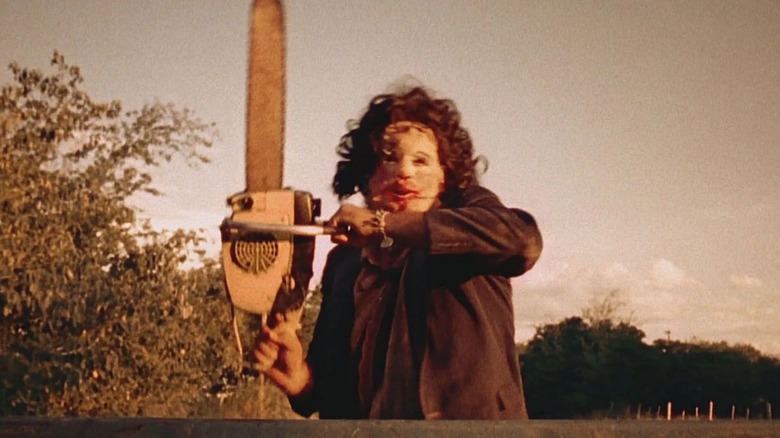The Movies And Shows That Kickstarted Rob Zombie's Love Of The Horror Genre
You might be surprised that a man named Robert Bartleh Cummings might be into vintage horror films and TV shows. A guy with that name is probably sitting on a yacht, reading the financial section of the Times as his butler brings out caviar and Cuban cigars on a silver platter. But if I told you that man is better known as Rob Zombie, then the surprise factor is out the window. The man's chosen stage name is "Zombie," for God's sake. Of course he loves horror.
Rob Zombie and horror imagery go together like peanut butter and chocolate. Genre has been part of his identity even before he became a horror filmmaker himself.
Mr. Zombie is wrapping up work on a new version of "The Munsters," a feature film adaptation of the classic lighthearted monster show. While it is a departure from his other feature film output in that it is happily rated PG instead of the hard R or even Unrated content of his past features, Zombie is pulling from the same love of genre as he has from the beginning of his career.
Starting with TV
Robert Zombie was born in 1965, which puts him in the golden era of TV, pre-VCR and cable TV revolution, where shows like "The Twilight Zone," "The Addams Family," and, of course, "The Munsters" were found on the few channels that existed.
Zombie cited those three shows in particular in a 2014 interview about growing up in a small, Sleepy Hollow-ish New England town where the easiest place to find monster stuff was on the boob tube, from the family monster shows to broadcasts of black and white horror classics.
So that might give you an early indicator as to why the dude behind such in-your-race gruesome horror movies as "The Devil's Rejects" and "House of A Thousand Corpses" is so gung-ho about his PG remake of "The Munsters." Yes, the man loves extreme horror, but he was brought up in an era of family-friendly spook stories. In fact, Zombie turned to "The Twilight Zone" right at the beginning of the pandemic in 2020, posting to social media that he was rewatching the show and asking for his follower's favorite episodes.
Freaks and Monsters
Given his music and the vast majority of his film output, you'd think the more extreme horror would be what Zombie cites as his inspiration. But when asked in interviews about his favorites, he tends to focus on classic films, with a particular fondness for pre-Code horror.
Pre-Code means before the Hays Code, the very first and very strict morality guideline implemented by the studio system before the MPAA ratings we have today. This is the reason you didn't see things like married couples sharing a bed or open mouth kisses in a lot of older Hollywood films. The Hays Code was established in 1934 and lasted until 1968, so when Zombie praises pre-Code horror, he's talking about some very early horror movies.
Tod Browning's "Freaks" (1932) is a favorite of Mister Zombie. This horror classic, set at a carnival with a cast of real disabled performers, wouldn't cause modern audiences to bat an eye, but at the time, it was flat-out scandalous. People fainted, vomited, and one woman threatened to sue the studio, MGM, because she blamed the film for causing her to miscarry, as reported in Angela Smith's book "Hideous Progeny: Disability, Eugenics, and Classic Horror Cinema."
It makes a lot of sense that a critically reviled and extreme (for its time) horror movie like "Freaks" took up so much headspace for young Master Zombie. Also not surprising is his love of the classic Universal monsters.
The movie Rob Zombie named his band after
Director Tod Browning is the connective tissue here. He directed "Freaks" and also directed a little movie called "Dracula" starring Bela Lugosi. You might have heard of it. When it comes to the classic Universal monsters, it seems their brevity is what really appealed to the musician:
"I love the Universal stuff 'cause a lot of it is 69, 70 minutes. Get to the point, boom, body out of the grave, let's build a monster! After 90 minutes, I get a little squirrely in the feet. Especially if you're seeing simple things, like I don't want a two and a half hour superhero movie. Cut out an hour of that."
Other pre-Code favorites of Zombie's include a trio of 1932 spook-a-blasts: "Island of Lost Souls," "Murders in the Rue Morgue," and "White Zombie."
"White Zombie" should ring some bells for fans of the musician, since he named his band after this Bela Lugosi shocker, which is often credited as being the origin of zombies on screen. However, it should be noted that this is the pre-George Romero definition of zombie, one that requires a witch doctor to use magic to turn dead people into mindless automatons.
Romero Zombies and creatures
Creeping into the 1950s, Rob Zombie continues his Universal streak with "The Creature from the Black Lagoon." Zombie has spoken openly about his love of the design of the Gill-Man monster, and he even got caught up in the remake rumor mill because he once stated that "Creature" is good material for a modern remake. He since had to make sure everyone knew he wasn't planning on actually remaking it, but the point stands.
The 1960s saw many influential films for Mr. Zombie, but there are two that seem to stand above the others. One is the artsy, dreamlike "Carnival of Souls" from 1962, which Zombie ended up naming his 2002 album after. It should be noted that this is the album that gave us "Dragula," and we've been digging through the ditches and burning through the witches ever since.
The other major '60s title that captured Rob Zombie's imagination was George A. Romero's "Night of the Living Dead," released in 1968, the same year the Hays Code ended and our more modern rating system was implemented. It makes sense that Romero's first "Dead" movie was a favorite of Zombie's. It's a spunky, short game-changer that really annoyed off the squares with its in-your-face violence and on-its-sleeve social politics.
Monroeville Mall and Travis County, TX
Zombie's love of Romero doesn't end with "Night of the Living Dead." In fact, that movie tees up 1978's "Dawn of the Dead," which Zombie calls "The movie I love the most, and watched the most." Sounds an awful lot like he's saying "Dawn of the Dead" is his favorite movie there, doesn't it? He continues:
"It became one of those things where I had it on VHS and I'd watch it every single day. Even if I wasn't paying attention to it, the sound in the background was soothing."
That also explains why he has gone out of his way to cast "Dawn of the Dead" star Ken Foree in his films.
And that leaves a film which Zombie said changed his life: 1974's "The Texas Chain Saw Massacre." In a piece for Rolling Stone, Zombie shared his experience seeing the trailer for the first time on TV at the tender age of nine and how entranced he was by it. He also had a friend over who was so scared by the trailer that his mom had to come over and pick him up. Different strokes, different folks, etc.
The anticipation factor paid off
It took Zombie seven more years to finally see the movie. Remember, this was back in the day before video stores existed, let alone having every movie in the world available to stream or rent at a moment's notice. So Zombie had built "Chain Saw" up in his mind, becoming obsessed over the TV spots that ran in his childhood and whatever stills he could dig up in magazines.
When he finally saw it, it was everything he hoped it would be and more: "It was a genuine American nightmare caught on film for all the world to see."
Over the years, many of Zombie's fans (and harsh critics, for that matter) have pointed out the influence "Chain Saw" had on his films. "The Devil's Rejects" in particular feels like it's cut from that same sweaty, real southern nightmare cloth as Tobe Hooper's classic. It's also been noted that Zombie's version of Michael Myers in his "Halloween" films resembles Leatherface more than John Carpenter's original version of The Shape.
As a fan of all horror eras, there are countless more titles that Zombie champions, from "The Shining" to "Let the Right One In." But the titles mentioned here are clearly what shaped and formed the gleefully disturbed psyche of one of the top figures in the genre. Maybe it's time for a marathon?
